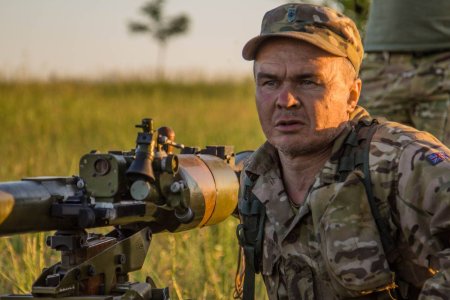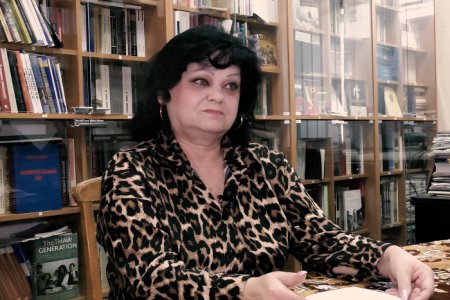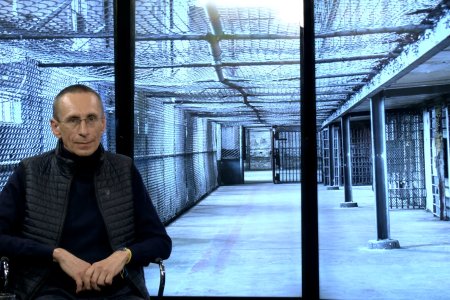“It was the most terrible moment of my life. I was sure that I would die,” — this is how Canadian Paul Hughes (59 years old) describes his most dramatic episode during two years of volunteering in Ukraine.
In July 2022, he was in the Borodianka area when he received a request to evacuate a six-year-old girl from the “Zaporizhzhia area.” He couldn’t refuse. However, when Paul got to Zaporizhzhia, it turned out that the place was a part of the Zaporizhzhia region occupied by the Russians. The former military man decided to take a risk but quickly regretted it.
At one of the checkpoints, the Russians stopped him, and when they found a man who spoke English, Paul realized that they wanted to take him and his car somewhere. “I never think of anything as a game, but this game was over for me,” — comments the Canadian.

He was taken to Vasylivka, where the invaders already had a stable stronghold. A lengthy interrogation began. Paul was considered a Western spy, and he tried to prove that he was an ordinary volunteer.
When the commander entered the room, the Canadian thought he would become his executioner. Hockey helped establish communication with him.
— So you’re from Canada? — asked the Russian. — Do you like hockey?
— Yes, of course, I love hockey, I’m Canadian.
— Who is your favorite player?
— Ovechkin, — Paul answered, remembering Putin’s favorite hockey player.
— Ovechkin?! But Ovechkin is shit! — the Russian commander suddenly became indignant.
— Tretyak? — After thinking about it, I decided to name another famous Russian (Soviet) player.
— Oh, Tretyak is good! — the Russian said, instantly becoming kinder.
Despite his burly appearance, Paul says he saw some understanding when they went out for a smoke after an eight-hour interrogation: “I felt that underneath his armor and everything, there really might have been a good man.” In the end, Paul asked what would happen to him and his things and heard in response that everything would be given back to him and he would be released.

Paul Hughes was fortunate then: he even returned to headquarters to ask for a written document. He didn’t want this story to repeat itself at the next checkpoint. However, one can only imagine how often his big heart quickened that day.
When a local helped Paul connect to Wi-Fi, it became clear that he was only one and a half kilometers from where he was supposed to pick up the girl and other people. He immediately went to a point on Google Maps and found an old garage and a bombed gas station there.
“I shouted, ‘Hello! Anyone here?’ — someone started to come out and, and it was the girl. She saw me, my car, and the Canadian flag. She ran and just jumped on me. She was shaking all over.”
Paul put the girl and four other people in the car when suddenly the mortar attack began. Without hesitation, the Canadian rushed from the occupied territory and eventually successfully brought the child to the Ukrainian-Polish border, where her mother picked her up.

It was one of more than three hundred missions of the HUGS organization, which Paul Hughes and his son Mac founded.
They repaired more than 300 cars
We talk with Paul in their garage in Kharkiv, where volunteers from around the world repair military and volunteer vehicles. The floor shows a wall where photographs and trip numbers from two years are hung on chipboard. Someone asks him about Volchansk, and he immediately tells the exact time and how long it takes to get there. The HUGS organization, which stands for Helping Ukraine Grassroots Support, has programs to help children in frontline regions, IDPs, etc.


Before the recording begins, the lights are turned off, which is commonplace in today’s Kharkiv. We are saved by another Canadian named Jaypie, who has his own small environmental organization, Pollute Free: he is in the process of installing solar panels and was able to settle part of the garage, through which more than 300 primarily military vehicles passed during the war, which are repaired here for free. “People contribute on different levels,” comments Paul.

The garage itself is covered in flags, and there is even a poster of the Hemp Freedom March. Over the past year and a half, people from more than forty countries have visited here. Paul boasts that his organization has been able to grow and build new connections. And it’s hard to argue with this: the garage creates the feeling of an anthill, where different people constantly come. Paul always communicates with them while smoking cigarettes and drinking Ukrainian beer occasionally, which he likes (excellent beer). On the wall, you can see a photo of Paul with the Kharkiv mayor wearing hockey jerseys of Ukraine and the Calgary Flames, a team from the city in Alberta where Paul lived before coming to Ukraine.
In Canada, Paul Hughes was involved in farming and charity work, an experience he claims helped him create HUGS. The organization is also active in Kherson, where Hughes Jr supervises it.
“Orcwellian times”
I ask Paul: “What would you say to those in the West still skeptical about the war in Ukraine?”
“I’m not sure I can say this on camera, but probably the first thing I would say is, ‘Get your head out of your ass.’”.

“Now we have personal experience, and we see with our own eyes what is happening here,” — Paul continues more diplomatically. “This is a blatant and brutal attack on a sovereign country—Ukraine.” You know, I try to talk to these people, but the world and people’s perception of information has changed somewhat. Even with vast amounts of data proving that this attack was a baseless, murderous act of war crimes, people cannot understand what is happening. They have blinders on their eyes. Even when you present facts and empirical data, people still argue.”
“We live in very strange times. George Orwell wrote 1984 and Animal Farm, describing how the propaganda machine distorts reality. I use the word Orcwellian. We live in Orcwellian times when Russians lie. All they do is lie! We’ve known this for 40, 50, 60 years.”
Having spent months researching Russian fake news about Biolabs and chemical weapons, I understand Paul perfectly.
“Russia must return all territories and compensate for the damage”
“I fundamentally believe in peace,” — begins the Canadian, who turns 60 in June. “But under what conditions?” The cost of this war for Ukraine is very high: dead people, and bombed houses, churches, hospitals, and schools. Unfortunately, we cannot say that peace is an option now. For peace, there must be an agreement providing total compensation for Ukraine. They must also return all lands to Ukraine, Crimea, and other parts of the regions. However, the Russians do not consider this.”
“Until we have consensus on this, there can be no peace agreement. It is possible to agree on a ceasefire, but it is almost impossible to talk about full-fledged peace under current conditions.”
During his first month in Ukraine, Paul Hughes felt emotionally exhausted almost daily. “I put my heart into this, and it was deplorable to see people suffering due to the actions of a psychotic madman. I have seen people in trouble who have lost their homes to fires in Canada, but not on this scale.”
“I’m dealing with it better emotionally now, but it still hurts to see these things every day. Whenever you see a destroyed house, scattered paintings, photographs, and children’s toys — this is someone’s life! These are not soldiers; they are just a family that has lived their lives. The only thing they are guilty of is that they happen to be Ukrainians.”
Paul and Mac discussed how long they would have to stay in Ukraine. They promised they would be here until this war was over.
“I tell people it’s like talking to a fireman. If you ask: ‘Hey, fireman, when are you going home?’ the fireman answers: “Well, when the fire is over.” So the same thing for us.”


